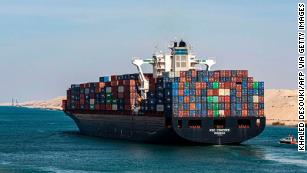The average number of ships that transited through the canal on a daily basis before the accident was between 80 to 90 ships, according to Lloyds List; however, the head of the Suez Canal Authority said that the channel will work over 24 hours a day to facilitate the passage of almost 400 ships carrying billions of dollars in freight.
The journey to cross the canal takes 10 to 12 hours and in the event the channel operates for 24 hours, two convoys per day will be able to successfully pass through.
Still, shipping giant Maersk issued an advisory telling customers it could take "6 days or more" for the line to clear. The company said that was an estimate and subject to change as more vessels reach the blockage or are diverted.
The rescue operation had intensified in both urgency and global attention with each day that passed, as ships from around the world, carrying vital fuel and cargo, were blocked from entering the canal during the crisis, raising alarm over the impact on global supply chains.
Promising signs first emerged earlier on Monday when the rear of the vessel was freed from one of the canal's banks.
People at the canal cheered as news of Monday's progress came in.
"Thank God the ship has floated," one person could be heard saying in a video, as the surrounding boats blew their horns in celebration. "God is great. The ship has floated."




